This wonderful community gathers at the Church of the Tikhvin icon of the Most Holy Mother of God at the former Simonov Monastery in Moscow—one of the most ancient monasteries of the Russian capital. Today, we are talking with Archpriest Andrei Goryachev, rector of this church, who speaks the same language as those who cannot hear and understands perfectly those who cannot speak.
These people need our aid. They are unable to call an ambulance or complain about one or another problem aloud, although they do have many problems.
Fr. Andrei has served at the former Simonov Monastery for over twenty years. He has also been assisting several boarding-schools for deaf and mentally handicapped children in remote regions of Russia.
Today, we are discussing the ways in which deaf people live in a world full of sounds, the difficulties in communication between hearing and profoundly deaf people, specifics of church services for such people, and their church life. Fr. Andrei will also tell us about the work he and his parishioners are doing for the restoration of the monastery and its ruined graveyards.
“We distance ourselves from the deaf, and not the other way round”
—Fr. Andrei, what kinds of barriers stand between a hearing person and a person with a hearing impairment?
—Unfortunately, very few people are concerned with the ways in which deaf people perceive the world around them. These few are mainly people who work with the deaf, or have hearing-impaired children (or other relatives) themselves. Ordinary people with good hearing avoid these barriers entirely, simply because they are not prepared to communicate with deaf people and feel uncomfortable around them. Psychologically, most people feel awkward when they do not hear the sounds they are accustomed to in any verbal communication, as is the case when they interact with hearing-impaired people. Because a deaf person cannot hear his voice, and therefore cannot control its timbre and volume, a hearing ear will sometimes find the resulting sounds discomfiting. Because of these communication barriers, problems of deaf people often remain unsolved.
—Deaf people form their own communities. For some, it may seem that these are rather closed, private groups. Is this true?
—It is we who distance ourselves from the deaf and not the other way around. Hearing-impaired people live active lives, just as we do. Once they are diagnosed with hearing loss, deaf children are sent to specialized nursery schools from their infancy. There, they are taught according to special programs and receive hearing aids. Next, they study at general education schools and then continue their education at ordinary colleges or universities (depending on their academic achievements at secondary general education schools). The only difference is that their process of studying is longer than at ordinary schools. They are taught absolutely the same programs. As they become adults, they get married and work. They live with us, in our common world, but we choose to close our eyes and ignore persons with this particular type of disability. We choose not to regard them as disabled people. We typically perceive as handicapped those with some outward sign of their disability: blind people with white canes, lame people with crutches, or paralyzed people in wheelchairs. However, the deaf are handicapped, too, and they face a huge number of problems of a somatic nature. Unless they are communicating with each other using sign language, we often do not notice such people in public places. As far as their communities are concerned, yes, they do have, for example, the Deaf Association and the Moscow Theater of Gesture and Mime—there are even honored actors among those who work there. So, they live active lives, although we do not see this—or do not want to see it—for one reason or another.
—The latter point is more likely: we are not inclined to see people with any sort of problems. We usually “have no time” for problems.
Most of us are living in a hustle and bustle and we are, indeed, “too busy” to think more deeply on many serious issues. Moreover, as I have already said, hearing-impaired persons do not attract our attention with outward indicators of their disability. You will not go unaware past a person walking on crutches or moving on a wheelchair—and these people frequently beg for money as a means of subsistence—but we cannot distinguish a deaf person in a large crowd. Meanwhile, they face far more serious problems than the disabled of many other categories.
Captives of the world of sounds
—What makes the life of deaf people so difficult? After all, they can ambulate and are able to see everything…
—Life is difficult because they have no hearing and, therefore, they lack the information field in which the rest of us live. If a deaf person suddenly feels unwell, how can he call an ambulance? If a fire starts in his flat, how can he call a brigade of firefighters? He cannot speak on the telephone! In any emergency situation, he will be faced with many difficulties. How will he speak at a housing maintenance office, for example? Here is a common situation: a hearing-impaired person cannot hear water flowing from the water tap and thus floods the neighbors living in a flat below. What usually happens in these situations? His neighbor from downstairs will come and knock on his front door. Even if a hearing-impaired person opens the door (fitted with a special flashing light signal), all the same, he will not be able to hear the flow of words hurled at him in annoyance and irritation by the neighbor.
—Do deaf people have to face such aggression frequently?
—The deaf often have to face aggression and hard-heartedness. Many people are simply unwilling to speak to them. Here is one egregious example: once, a deaf, elderly woman came to my church and said she felt very sick. I suggested she go to the doctor as soon as possible—but the doctor at the outpatient clinic would not take the trouble to speak to her and understand her! He took no time to understand that this woman was disabled, that she was deaf. He simply said he had no time to use writing as a method of communicating with her during her appointment.
—It appears that the disabled are treated as second-rate citizens…
—Yes, and the deaf realize this themselves, through the way they are treated by others. Do you know what I did in that situation? I wrote a very polite letter to that doctor on behalf of the elderly woman, indicating everything she had tried to explain him the day before: “Good afternoon, doctor! I am deaf. I feel very sick. I have such-and-such symptoms.” Then, she came to the same doctor with this letter. Having read the letter, the doctor called an ambulance; the woman was taken to a hospital and was treated there for a month. So, that poor woman received care and attention only after I had made an appeal on her behalf! I regularly have to write similar appeals for all sorts of instances, whenever my parishioners face this incomprehension of their problems or unwillingness to understand them.
I do not condemn these individuals who appear to be so lacking in compassion. Nevertheless, if a person appeals to you, you must do your best to help and understand him, instead of turning your back on him. Alas, the situation is quite the opposite of what one would hope for in outpatient clinics, social protection departments, financial settlement centers, or housing maintenance offices. The deaf take this unwillingness to understand them very badly. Having faced this lack of understanding so many times in their lives, more times than we can even imagine, they become very vulnerable.
—Hearing is such an important instrument of cognition in our world and a necessary means of communication. The absence of hearing renders hearing-impaired people very different from the rest of the world. What are some of the peculiarities of deaf people?
—Their life is different from ours in many aspects. The development and formation of personality in deaf people is an absolutely different process. The personality of a normal child begins to develop by his imitation of the sounds that he hears around him. He hears how his mum, dad, and granny speak, how a door creaks, how a spoon clangs on the plate, how his feet stamp as he goes, and so forth. This is the way in which associative links are formed. Deaf children have none of this experience. Therefore, their development proceeds differently and there are important psychological differences in their perception of the world around them. Hearing-impaired people often perceive everything very concretely, without any compromises. In many ways, their thinking could be called “black and white.”
This particularity develops from their childhood, and a deaf person bears this throughout his life. You must not steal, you must not deceive, you must be just to others, and so on. This person will never act in a different way—he will never take what does not belong to him and he will never be rude to others. Yes, he will be hurt, his heart will ache, and he will feel humiliation as any other person does, but he will never answer rude words with rude words. The hearing-impaired are purer than many of us, and this is true of their spirituality as well. They believe in God like children, even as adults.
—“The Lord sends situations which strengthen one’s faith”
—How do deaf people come to believe in God?
—That is a very difficult question to answer, because faith is an abstract category, not at all concrete—it is impossible to touch or see it. We, as people with perfect hearing, comprehend and experience our faith on a conscious level and through our abstract thinking. The deaf have a more concrete and objective way of thinking. This makes it very difficult to explain the meaning of faith to them and it is difficult for them to grasp it, to enter into faith. It is helpful if a person has a visual memory of how his grandmother used to pray when he was a child. If he remembers an icon, a lit vigil lamp, being taken to church—these memories will give life to his faith. If there are vivid childhood memories and impressions, then faith can be built in adulthood on this foundation. Still, sometimes it happens that a person comes to church, not understanding what it is like at all, but the Lord sends to him situations which strengthen him in prayer and faith. Through this, he comes to understand that he cannot live without it.
—Fr. Andrei, how was your congregation at Simonov Monastery formed? How did you build relationships with deaf, blind, and mute people?
—From the very beginning, when everything around here was a ruin, deaf people had a special attitude towards the house of God. For example, deaf people consider it bad manners to come into a church in outerwear. Most of us do not think about it at all. We enter a church and do not even shake the snow from our collars. For the hearing-impaired, this is unthinkable. These people have a particular culture of relations; they must necessarily take their outerwear off immediately, because this is a special holy site where people pray. So, we had our own “cloakroom,” where we took off our coats.
As you and I know, it is easy to enter and leave a church unnoticed. Once, a deaf woman came to us for the first time, and, after the service, it emerged that her leather overcoat with a fur collar had been stolen. That was a tragedy and a shock. At the very least, I had to find something for her, straight away. Then, I thought to myself, “this woman will now go home in this short jacket we have given her, in place of her leather coat with a fur collar, and we are sure to never see her again. Why should she return to the place where she was robbed? Further, she will think that the church is a place where bad people and robbers gather.” I said to my parishioners, “Let us pray.” I cannot say that I firmly believed we would find the stolen overcoat, but we did pray. All of us prayed. On the following day, at the entrance to the metro, one of our parishioners spotted a homeless woman with several coats on her, wearing the coat that had been lost at our church over all of them! The coat was returned, but that is not the end of the story. The woman whose coat had disappeared at our church did return to us, and we gave her the coat back! These answered prayers become irrefutable facts for deaf people and, for all of us, these facts are indicative of our need for faith in God and of our need to join together in prayer to Him. There were a great many similar miracles. Some occurred even with those who came to our church just to have a look, curious to know what is happening there, why some priest is waving his hands. Many came out of mere curiosity only to remain forever. By the way, many former members of Baptist communities and Jehovah’s Witnesses joined us. It was hard for them to break out of the habits they had acquired in those sects, but nevertheless, they have remained with us, glory to God. This is the grace of God. Joint prayer contributes to great inner spiritual changes in a person!
Feeling the joy of giving
—In what year did you begin serving at Simonov Monastery?
—We have held services for the deaf here since 1995. It has touched me to the heart and moved me to tears, to see these people change over the course of time. At first, all of them used to tell me: “Our disability is the most severe and our hardships are the worst.” Indeed, I realized that their hardships were among the greatest. However, I observed how people who used to define themselves in this way changed gradually. At first, they often asked: “Why should I prepare an intercession list?” “Why should I take this candle and pay money for it? It will burn out and what will I gain from that?” Many of the first parishioners came with this mindset: “I am handicapped. I am supposed to receive such-and-such things. Please, give them to me!” They had no idea that all of us must give something, too. Little by little, their way of thinking transformed; they began to realize that the more you give, the more you will receive in return—kindness, concern, and love will return to you.
In the year 2000, the first people who were blind, deaf, and mute came to us. Now, deaf parishioners saw, with their own eyes, those in a worse situation than their own—these people could not even travel alone and were all but totally isolated from this world. Here is a person who can neither see nor hear, but he comes to a service! So, our deaf parishioners decided among themselves to help the blind, deaf, and mute by explaining the Liturgy to them by means of the tactile signing—“hand-into-hand.” This is the way the deaf, blind, and mute communicate. For me, it was such a great surprise, such a great spiritual joy, that I have probably not experienced any greater. It was wonderful to see those who had not long before beaten their breasts, crying: “We live with the most severe disability! We need such-and-such things!” begin to help others who were in a worse situation than their own. These are the moments, revealed by God, that truly show how a person is spiritually transformed.
A “soundless” Liturgy—beyond the barriers
—Do your parishioners understand church services thoroughly?
—These people know church services even better than we do! I am able to ask any of them to help me during a service, because they know perfectly well the unchangeable parts of the Divine Liturgy: antiphons, the Cherubic Hymn, the Creed, “Our Father,” and so on. They can communicate all of this in sign language, in my stead, to those standing at a church service.
—Do you have acolytes as well?
—No, we have neither acolytes nor choristers. For some time, we did have a choir but then we decided we did not need it any more. I literally began to demand that deaf people “utter” all unchangeable parts of the Divine Liturgy, both with their voices and by means of signs, instead of the choir, just as I always do. The result, owing to this demand, in addition to our joint prayers, is wonderful. First, they no longer feel fatigued during services and, second, they speak with their own voices and better control them. If, earlier, they did not speak at all or would speak only in extreme cases, now they are no longer ashamed of their voices and they speak without fear. Most importantly, the barriers which usually exist between hearing and deaf people have been broken down. There are no such barriers here. Today, deaf believers take part in pilgrimage trips in the same groups with hearing believers. They confess and take Communion of the Body and Blood of Christ, communicating with priests who do not know sign language. This demonstrates clearly that they have overcome their fear of hearing people.
—And does this fear really appear initially?
—Yes, it does. They are afraid of not being understood, of being rejected, of not having enough time to communicate what they need or want to say. They now confess and take Communion. They will attend services at other churches because they know the Liturgy well. I ask them: “How do you know where you are in the Liturgy in other churches, when a priest has his back to the congregation?” (As for me, I always serve facing the congregation). “It is easy,” they answer. “If a service has commenced, then either a priest or a deacon exclaims: ‘In peace, let us pray to the Lord.’ If he ends, that means the first antiphon begins. After that, the ‘Again and again…’ exclamation follows, followed by the second antiphon. The procession is next, then the Epistle, followed by the Gospel.” Today, if they are going to some other church or on a pilgrimage, they will have read the Epistle and the Gospel of the day, beforehand. During the service, they will recall these texts.
—This is the work of the grace of the Holy Spirit, which enters into the hearts and souls of those who possess a sincere faith, who believe with a pure soul. Of course, there are many problems and difficulties. To begin with, a person who cannot hear external sounds is very sensitive to himself, especially physically; he is highly attuned to any kind of pain and ailment. The rest of us might ignore such complaints, but, for the hearing-impaired, any slight complaint matters.
—So, they are very sensitive and often feel anxiety?
—Yes, to some extent. They are anxious about their health because of this heightened awareness: if they feel unwell, a doctor probably will not understand them, which leads to anxiety about their health.
The most important thing is this: the hearing-impaired people who came to us are now beyond the communication barriers that once held them back. Although the deaf live near to and around us, they nevertheless hide within a shell, withdrawing into their tiny world, their own social environment. They communicate with each other, not with us. There are specific places and premises where they gather and spend time together, but this is a limited communication among the deaf community only. We will not go there and even if we are invited, we will not understand what we experience there, anyway.
—As a pastor, do you know couples in which one spouse is hearing and the other is deaf?
—Yes, there are such couples.
—Please, tell us about this in more detail.
—There are very many problems in these situations. Even if we consider an ordinary, non-disabled couple, we already find many issues in family life, especially when all the rush of romantic emotion dwindles and everyday life begins. If we consider a couple in which one spouse is deaf, then problems double, triple, increase five-fold, and so forth. Partly due to our efforts, this church has become a real home to the deaf community, and that makes me feel a great joy. I try to treat every parishioner as a family member. It may sound too lofty but, truly, we are a family.
By voice and signs
—Fr. Andrei, a sign on your monastery gate reads that you are a community of deaf and blind, deaf, and mute people.
—That is just what is written there. We are an unusual parish church. At first, I tried to resolve the questions of our dual identity, but I was instructed that we could have only one juridical entity. Either we are a religious organization, under the jurisdiction of the Patriarch of Moscow and All Russia, or we are a disabled organization and are therefore subordinated to the All-Russian Society of the Deaf [the former is true—Ed.]. This is why we have this sign; perhaps it will inspire a hearing person to stop for a moment, think about it and ask: “They are deaf or blind, deaf, and mute! How do you communicate with them?”
—How long did it take you to master sign language and break down the psychological barrier?
—To master this language?! It is impossible to master it. This is a life and environment of continuous work. This is true of any foreign language—you can learn it, but you will be able to speak in it only when you are in its environment. Many of us have studied foreign languages at schools and universities, but when we visited foreign countries where the language was spoken, very few of us felt free there.
—We work and make progress here all the time. Unified sign language is not taught at schools as the Russian language is; there is no instruction on how to write and speak sign language properly. Sign language is recognized as a means of interpersonal communication, but it is not recognized officially as a language, therefore, it cannot be taught at schools and in a consistent manner (for example, this sign means this word and that sign means that word). In reality, there are many different variants of word-signs, therefore, sign language is often perceived not only through signs, but also through articulation.
It is gratifying to know that our church has become a place where people come not only to pray and express their spiritual religious feelings, but also to communicate, celebrate birthdays, name days, wedding anniversaries, births of children, and so forth. A full-fledged life can be found here. When any elderly parishioners are absent at services for a week or two, people begin to worry, to find out what happened, and to see if they can help and support one another.
—Do you serve any particular Liturgies for the blind, deaf, and mute? Are any services performed with a choir, familiar to ordinary hearing people, held at your church?
—All services here are held with the use of voice and signs simultaneously. The clergy include myself and a deaf priest who, on my recommendation, was first ordained a deacon and, later, a presbyter. He is the first and, so far, the only deaf priest—Fr. Valentin Terekhov.
—Does he confess?
—He serves and confesses like me. It took a great deal of time and difficulty for us to determine the way in which we would serve together. I am always so happy to hear these words from people who come to us for the first time and ask, in amazement: “Is he really deaf? He does not look or sound deaf at all!”
—Does Fr. Valentin utter the words of a service aloud?
—Yes, he does. Like me, he holds all services using his voice and sign language simultaneously and we communicate with each other in this manner. I communicate with our parishioners in this manner, too. Everything is based on signs and articulation. Not everybody can “read” words from lips, but the sign language is known to all.
—Can hearing people attend your church?
—Why not? You are welcome! We are not a closed territory.
—Do people with normal hearing come often? What is their reaction to your services?
—In most cases, those with normal hearing who attend our services have relatives with hearing impairments. Also, elderly people who lived on the territory of Simonov Monastery in their childhood come to us. When the monastery was closed, many structures were on its territory, including barracks. Those who spent their childhood here—those who would play, run, and jump here—are glad that services have resumed at the church and monastery. To them, it does not matter that no choir sings at services. They are happy to come and worship together with us. We have come to love each other over these years.
Most of those whom you will see at our services are our parishioners. “Strangers” do not often come to us. For an average person, it is considerably difficult to fully enjoy our service. There are many churches offering beautiful choir-singing, rather than our cacophony, which is not for all. Still, just as parents rejoice when their baby utters its very first word, I always rejoice when someone who first refused to speak begins to speak and I hear his voice at the service.
—When they begin to speak, these people become more deeply integrated into our “hearing” society, don’t they?
—Not only that. They begin to live among us. A process of spiritual and social rehabilitation is occurring. The hearing-impaired do not feel very comfortable finding themselves among twenty or thirty hearing individuals. Likewise, you will not feel comfortable finding yourself among twenty or thirty deaf people who speak a specific language among themselves which you do not speak. But such a situation is often normal for a hearing-impaired person. The atmosphere at our church is different. They are the masters of the situation here and they must explain to hearing visitors how to light a candle properly, how to prepare an intercession list, or how to order a prayer service or a memorial service. At first, they were scared, but now they feel more confident and are able to help explain something or rebuke someone on their own.
—You have truly developed a school or a university! People undergo a real rehabilitation course in your church.
—There is no course here. At the very beginning, when we were about to start services, we indeed studied at desks, explaining the meaning of each new word, because the vocabulary of deaf people lacked many of the terms and words which you will need during a church service. Now, these classes are held at the Sunday school run by Fr. Valentin. This has become a kind of transfer of skills, from the experienced to the young, who are newcomers here and have a desire to work with us for some amount of time.
“Buy a sick child a hearing aid!”
—How can a non-disabled person help your community? What can a person who sees and hears well do for you?
—Perhaps my words will be perceived ambiguously by some, but one can help us only financially, by transferring money to the settlement account of our church. Please note that you can direct your donation by marking the “Type of Payment” section in the following ways: “aid to disabled children,” “communal public services” (and we pay a great deal for these, because we own many buildings), “repair-and-renewal operations,” or “general church needs.” These funds are also used for the support of four boarding-schools, to which we give spiritual guidance.
—Where are these four boarding-schools?
—These schools are in the Kaluga, Bryansk, and Vladimir regions. They are boarding-schools for deaf-blind and mentally retarded children. We assist children who live outside Moscow and, therefore, in very difficult conditions. It is also a mutual enrichment of both our own deaf people and those whom we visit.
—How often do you visit these boarding-schools?
—Frequently! We visit with our Theater of Sign Language Song and show our stage adaptations. This is both performance and communication at the same time. For these boarding-school students, it is an opportunity to talk with disabled children of the same category who believe in God. This is a great chance to hear about the faith and God from other deaf people!
They eagerly anticipate our visits. We try to provide them with everything they need: books, toothbrushes, toothpaste, shampoo, and so forth. We help them to obtain text-books, interactive boards, and special equipment for dining-rooms, workshops, and classrooms. All of this becomes possible because of the generous donors who help us. How else can one help? Buy a disabled child a hearing aid! Together with the director of the Otofon rehabilitation center for the deaf, we examine children and choose hearing aids for them. We have collaborated with this center already for fifteen years. They serve the boarding-schools of Kaluga, Novozybkov (the Bryansk region), and Kirov. If a deaf child is from a deaf family, he usually has no opportunity to obtain a hearing aid—and it is impossible to study without one. Such children will develop too slowly. By the way, batteries for hearing aids are expensive and, as a rule, neither boarding-schools nor parents can afford to buy them.
Sometimes, situations are very difficult. Once, in winter, we went to one district center for Christmas greetings and left presents there. Later, I was told that one mother had called from a village and asked: “Please, if possible, find a way to deliver these presents to my home, as I cannot afford the journey to them—I must instead buy some milk for my children with this money.”
The aid rendered to us is substantial and significant. I thank everyone who transfers money to our settlement account so that we can have the opportunity to obtain hearing aids for deaf children in order that they might study well.
“Our icon has been streaming myrrh for many years”
—You mentioned how all that is necessary for your services was prepared by those under your care. Did they take part in repairing of your church building as well?
—I cannot say that the repair was done by their hands, though they were actively involved in garbage disposal, putting things in order, and beautifying this place. However, our vestments, bookmarks, cloths used at services—all of this was made by the hands of our parishioners. There are many excellent cutters, seamstresses, carpenters, and ebonists among them and they are continually contributing to the beautification of the church.
—We are not holding services in our central church at the moment, due to the emergency state of its stairs and the observation deck, which will be under repair shortly. We worship in the lower church, at present. The south side-chapel of our church, where we began our spiritual life, has special icons for the blind, which we ordered after the blind, deaf, and mute had joined our community in 2000.
—Is one permitted to touch these special icons?
—Yes, one is permitted to touch them, and the depiction of the icon is indicated in Braille (a form of written language for blind people in which characters are represented by patterns of raised dots that are felt with the fingertips).
The north side-chapel is the last of the central church’s five side-altars on which restoration work is approaching completion.
—I know that you possess a decorated and specially-venerated icon of the Mother of God.
—This is the icon of the Mother of God called “Softener of Evil Hearts” and it was painted by a deaf iconographer. This icon has been streaming myrrh for years. It began when the myrrh-streaming, wonderworking icon called “Softener of Evil Hearts” visited our parish in 2003. That was the first experience for our deaf parishioners of this kind—we were receiving a constant influx of hearing believers at our then-ruined church, which was in very hard conditions. Deaf people received hearing people! That spiritually encouraged our folk and acted as a great incentive for them. As a result, our people decided to adorn and develop our church further and wanted to have a copy of the “Softener of Evil Hearts” icon at our church forever. They said: “We very often encounter people’s evil hearts in our life; therefore, such an icon is relevant for us.” So, I asked our deaf iconographer to paint such an icon. He did so, and this icon began emitting myrrh. Drops of myrrh have been seen here for over thirteen years.
The decorations you have mentioned are tokens of gratitude left by people who prayed before this icon, asked the intercession of the Heavenly Queen, and received what they asked for. These ornaments are not very expensive, but they are spiritually invaluable. Their presence indicates that people did not forget the help they received and they came here to thank the Mother of God, bringing what they held dearest of all, with them, as a gift. These are neither gold, nor platinum, nor are they gold bullion, but these are all precious donations to the Holy Theotokos.
“The main miracle is a full church life of people who are deaf or blind, deaf, and mute”
—Fr. Andrei, what is the greatest miracle that you have witnessed at Simonov Monastery?
—A great many miracles are occurring here, but you must have spiritual sight to see them. For me, the main miracle is a full church life of people who are deaf or blind, deaf, and mute. Another miracle is a priest, elevated from the deaf-and-mute community, who serves Divine Liturgies, either with me or on his own while I listen to confessions. This miracle is not only for me to see, but for all who see and understand what is happening here by the mercy of God.
—With what words would you like to address hearing people? What should we understand about those who cannot hear?
—I do not think that any special words are needed here. I think we should simply be considerate and kind to others, not distinguishing between the blind and deaf, the legless and armless. One should continually have love in his heart and respect for his neighbors, not forgetting that any and every person is an image of God, just like us. We must correspond to this image of God in our love, care, and compassion for others.
***
Church details for those who wish to donate:
Full name:
Religious Organization: “Dependency of the Patriarch of Moscow and All Russia of the Church of the Tikhvin Icon of the Mother of God of Simonov Monastery of the City of Moscow, the Russian Orthodox Church of the Moscow Patriarchate”
De facto address
115280 Russia, Moscow, Ul. Vostochnaya, 4
Telephone/fax: (495) 675-21-95
Telephone: (495) 675-45-54
E-mail:
surdo-ch@yandex.ru
Website:
http://hram.deafnet.ru/


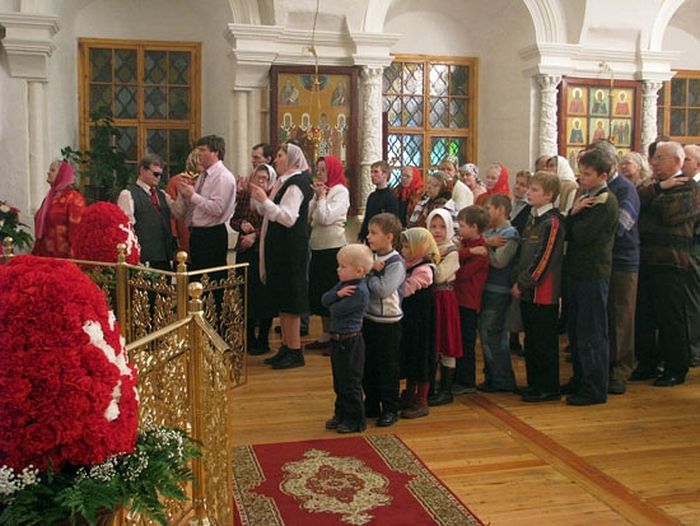

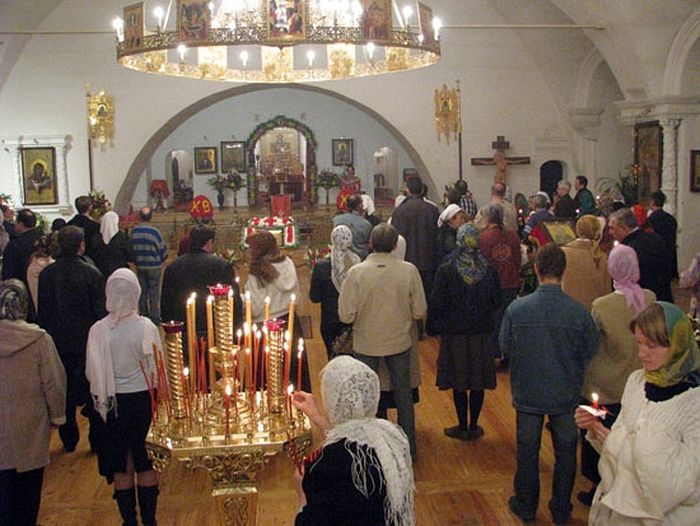


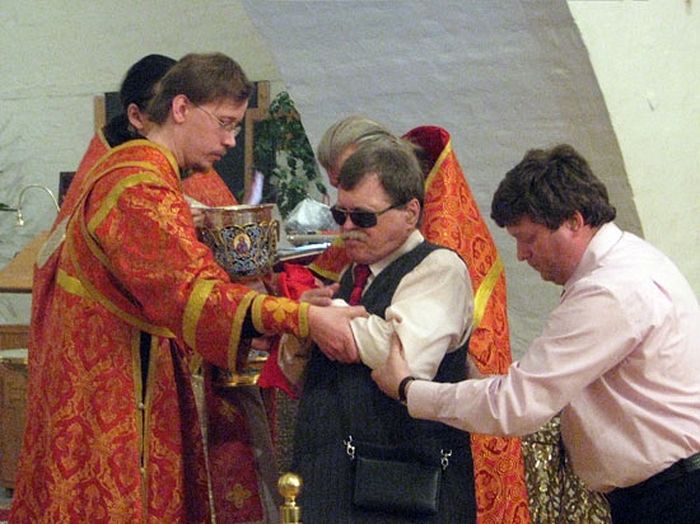
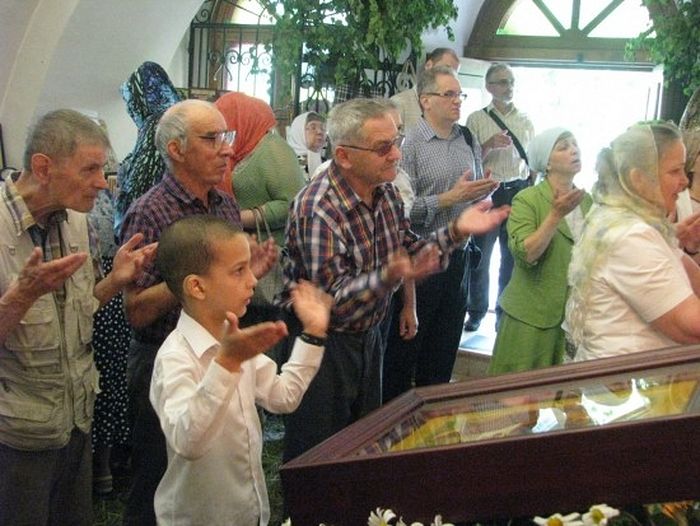


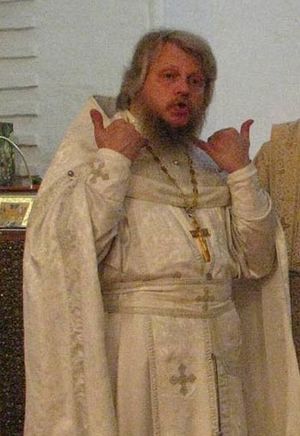
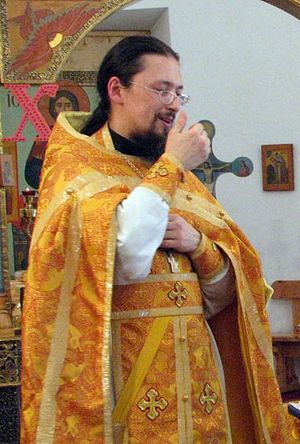
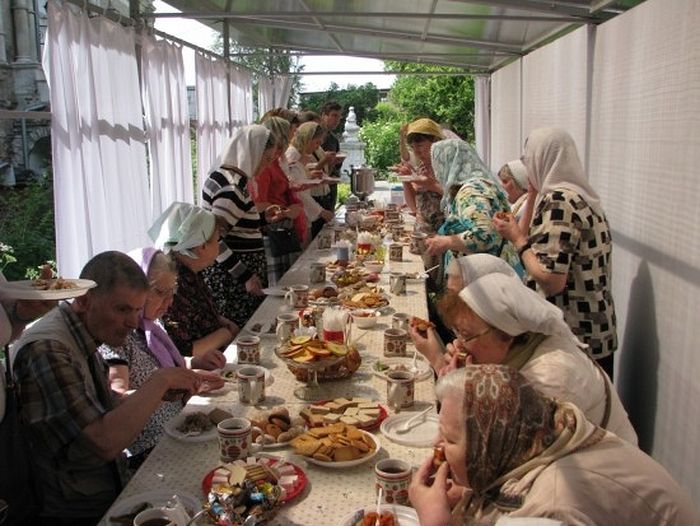
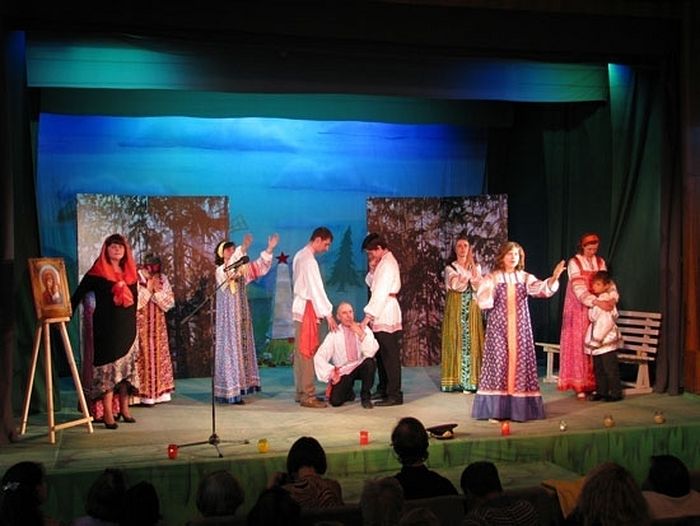
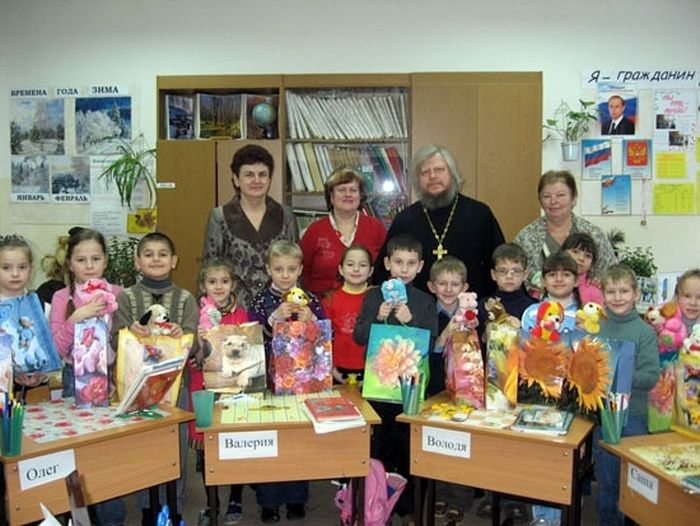
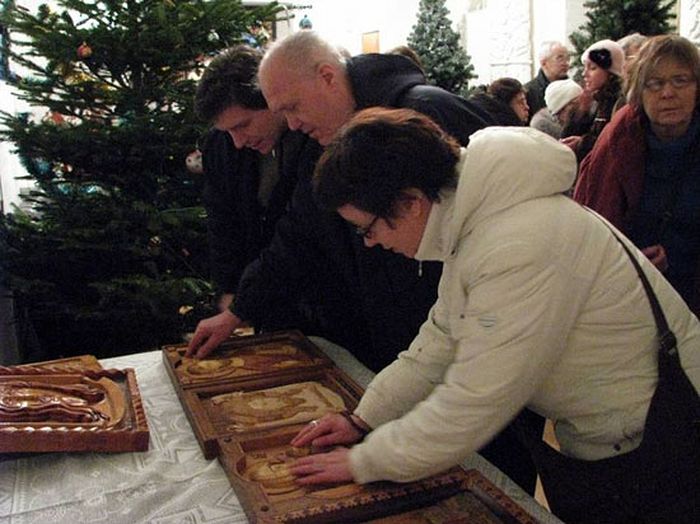
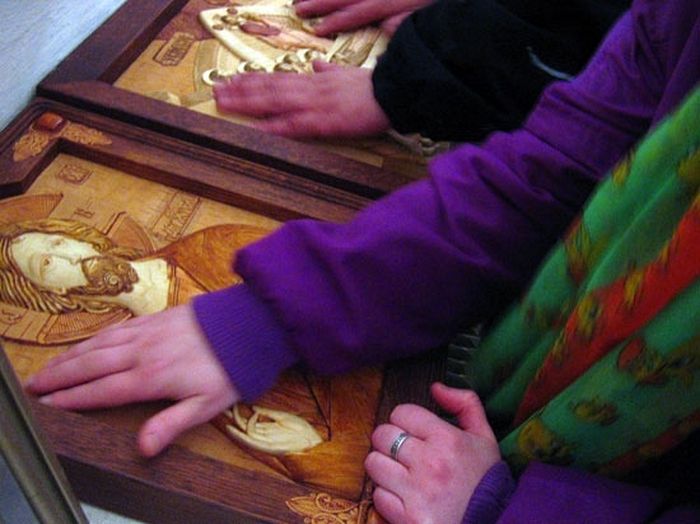
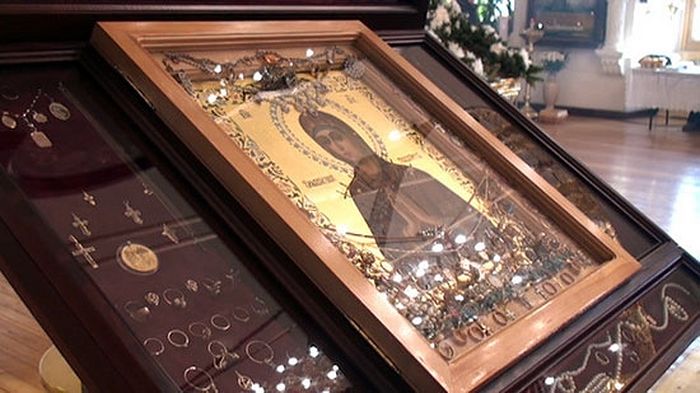
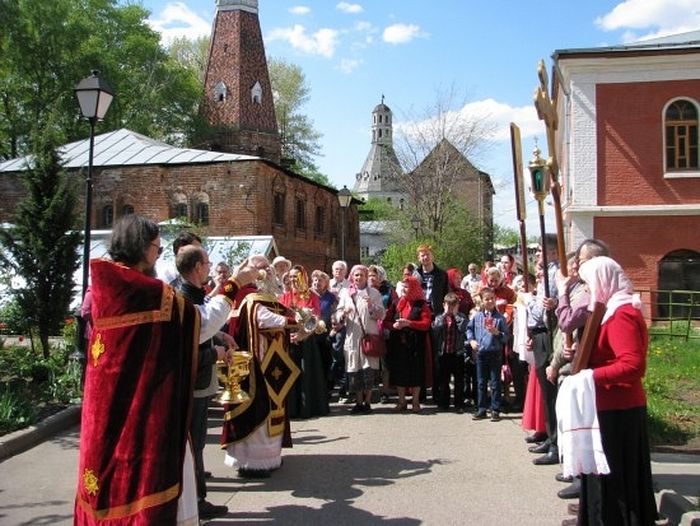
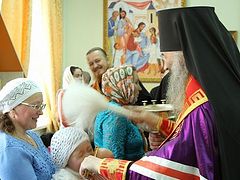

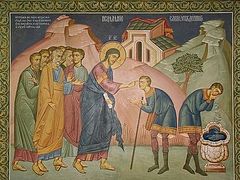
I am an interpreter for Deaf/HH in Oregon, USA. Do you know of any organization for Orthodox in the USA?
Thank you!
In Christ,
Raphaela